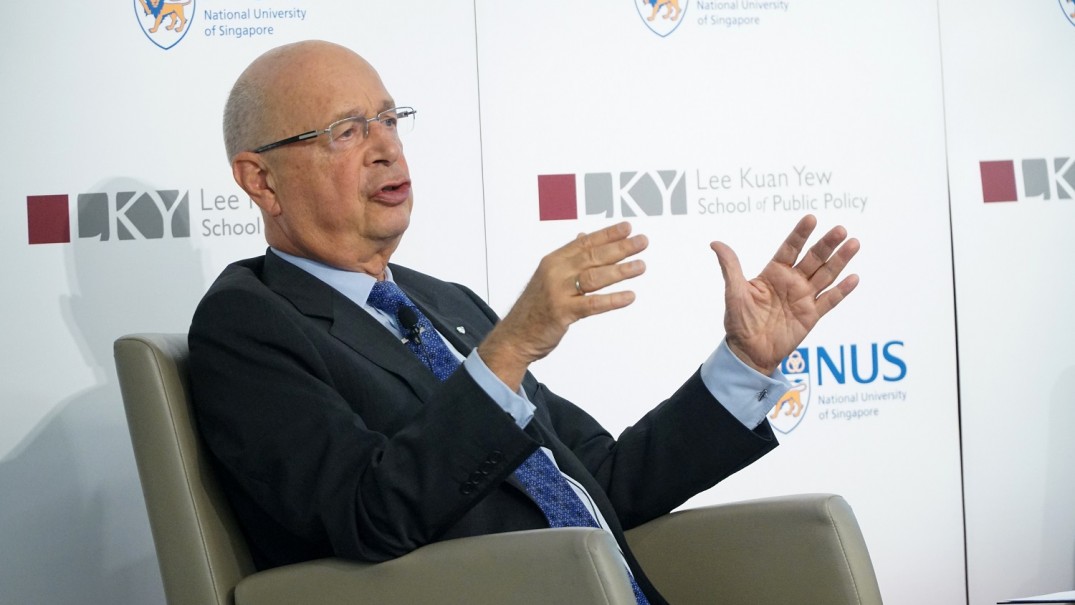
To thrive in the Fourth Industrial Revolution – a digital revolution characterised by an exponential growth of cyber-physical systems – human capital development is key.
“Capitalism will be replaced by ‘talent-ism’,” World Economic Forum (WEF) Founder and Executive Chairman Klaus Schwab said. “What has become crucial is brain power, and so we will have an economy which will compete mainly on the basis of talents.” And to maintain their competitiveness, countries will not only have to create talents, but also to maintain these talents through “up-skilling” and “re-skilling”.
In a bid to make the revolution more inclusive, to create new talents, countries confront three challenges: to secure access to electricity and the Internet, to cope intellectually with the speed of new information, and to deal with the loss of jobs to automation.
Prof Schwab was the guest speaker at the “Global Leadership Needed in the Era of the Fourth Industrial Revolution” dialogue session, organised by the Lee Kuan Yew School of Public Policy on June 20, 2016. To subsequently inculcate lifelong learning, to maintain these talents, education systems, communication infrastructure, and entrepreneurial development will also matter in the long-term, he added.
Individuals must therefore take advantage of the opportunities presented by these technological changes, while remaining cognisant of the negative implications, such as monitoring, surveillance, and how governments and corporations have the ability to track what we do.
It was a point agreed by Tan Chin Tuan Visiting Professor Danny Quah, who chaired the dialogue. He said: “We need to embrace [the Fourth Industrial Revolution], we need to go out there and learn everything we can, and we no longer have an excuse for not participating in this.”
These perspectives resonated with many in attendance too. When asked about what she thought was a distinctive feature of the revolution, Ms Dimple Mathdradas, Managing Director of The D Circle, a strategy, partnerships, and marketing service, said it was the speed of technological change, and the fact that “it is going to take a long time for people to catch up.”
Having just moved to Singapore from Silicon Valley, Ms Mathdradas tries to stay “as informed as possible”, so as to find out how to mesh innovation with her background in business, in governance, as well as in international affairs.
Points about personal responsibility were also made, especially in relation to the speed and quantity of new information in the Fourth Industrial Revolution.
“We may have the luxury of choice, though having too many choices can lead to paralysis in decision-making,” Mr Hongjun Wang said in an interview after the dialogue. Mr Wang is a member of the WEF Global Shapers Community in the Singapore hub. “If we are not mindful, we could become ‘silo-ed’, or could consume specific information without examining our assumptions along the way.”
The onus, it would again appear, falls on the individual. “Today, it is very difficult to predict or to plan what you should do in the future, in a determined way,” Prof Schwab concluded, and given this uncertainty everyone – the government, the companies, and most importantly the individuals – has to use a compass and a radar, combining both vision and agility respectively.
“[Because] you cannot plan step by step, you have to be in a constant learning mode. You have to send out radar signals to see how the environment responds to what you are doing, what you have in mind, and adapt constantly.”
This article is written as an opinion piece for the Global Leadership needed in the Era of Fourth Industrial Revolution dialogue session which took place at the Lee Kuan Yew School of Public Policy on 20 June 2016. The full dialogue session on Global Leadership needed in the Era of Fourth Industrial Revolution can be viewed here.